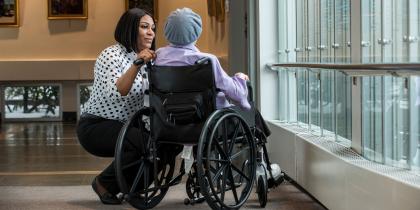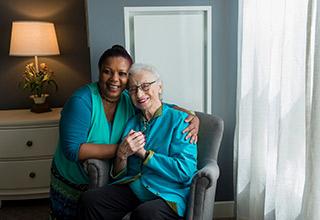Depression in Caregivers: Caring for Yourself and Your Loved One
Learn symptoms, coping methods, and why caring for yourself could make your loved one healthier.

It’s widely recognized that caregivers for those living with dementia are at an increased risk for developing depression. From Italy to Korea to Saudi Arabia to the United States, studies establish that caring for an individual with dementia increases your risk of developing depression or depressive symptoms. The research shows that as hard as it might be, as a caregiver you must prioritize your own mental health not just for your own well-being, but also for the health of your loved one.
The emotional toll of caregiving
Providing care for an individual with dementia is an extremely demanding task that requires hard-to-muster patience and attention to detail. It can cause high levels of stress that take an emotional toll; understandably, the energy and effort you allot to caregiving may leave you without the energy to prioritize your own well-being.
However, when your own needs aren’t being met—combined with the stress and emotional taxation of caregiving—you’re more susceptible to becoming depressed. And when you, as a caregiver, are not emotionally or physically well, it becomes increasingly challenging to deliver the quality of care you strive to provide. Thus, if you are caring for a loved one who suffers from dementia, professionals urge you to find time for yourself and to tend to your own needs.
Signs of depression
Feeling sad, down, or lonely is normal at times. But when you are feeling this way for an extended period of time, you may have clinical depression. This medical condition is serious and requires dedicated support. Detection, diagnosis, and treatment are important in order to successfully manage depression or depressive symptoms.
Common symptoms of depression to look out for include:
- Changes in sleep (sleeping more or sleeping less)
- Changes in appetite (increased or decreased)
- Less energy than usual
- Less interest or pleasure in things you usually enjoy
- Feeling restless or “on edge”
- Feelings of worthlessness or guilt
- Suicidal thoughts or thinking more about death
Consider changes in your mood as equally important to other changes in your body, and contact your doctor for follow-up.
What research shows about depression and dementia
The connection between depression in a caregiver and the physical health of the person they’re caring for is only beginning to receive the attention it deserves. A study conducted from 2015 until 2017 explored whether or not caregiver depression is associated with emergency department use among patients with dementia. Overwhelmingly, the data show that caregiver depression is an important risk factor associated with increased health care use by those living with dementia. Although one study isn’t enough to definitively establish this finding, it does highlight the impact a caregiver’s emotional well-being can have on the health of their loved one.
Interestingly, depression is shown to be “contagious” in the same way that happiness is “contagious;” that is, being around a depressed individual increases one’s own risk of developing depression. A 2011 study showed that this holds true for up to three degrees of separation! In other words, your mental health is affected not only by the mental health of your own friends and family, but also by that of their own networks. Though studies have not yet assessed whether this translation of depression is directly applicable to those with cognitive decline, it may be safe to assume that if you experience depressive symptoms as a caregiver, the person with dementia for whom you are caring may develop depressive symptoms as well.
The significance of depression in a cognitively declining person must not be overlooked. Studies show that depression increases the risk of dementia. The meta-analysis of sixteen recent studies that explored late-life depression and dementia concludes that late-life depression is linked to a two- to five-fold increased risk of dementia. This finding is not one-directional; dementia is also shown to increase the risk of depression. This two-way connection between depression and dementia highlights the importance of treating depression in those living with dementia. Given current knowledge, depressive symptoms are more treatable than dementia. So we can assume that some of the troubling symptoms associated with dementia may be alleviated by treating depression in a person living with dementia.
What can I do about caregiver depression?
Depression and dementia are linked in many complex ways, but the base influence of a caregiver’s depression affecting the person they’re caring for is simple and undeniable. Therefore, as a caregiver of an individual with dementia, prioritizing self-care becomes that much more important. By tending to your own needs, you are working to provide the best care to your loved one. In order to maintain a healthy and happy mind and body as a caregiver, health professionals recommend that you:
- Stay connected with those you care about
- Leave time to engage in hobbies
- Eat a healthy and balanced diet
- Exercise often – even a short walk is good for you!
- Get sufficient sleep
- Ask for help and try to find some respite from caregiving
- Join a caregiver support group
- Educate yourself on dementia so you can feel as prepared and in control as possible: take a Savvy Caregiver class, which trains caregivers in the basic skills they need to care for someone with dementia; look on the Alzheimer’s Association’s website; or ask an expert for reading material
This limited list is meant to provide you with a few ideas of how to tend to your physical and psychological health. You may find that your schedule varies greatly due to the unpredictable needs of your loved one, so think about what you can do with different amounts of time; try to be prepared when you find yourself with fifteen minutes, a half-hour, or more, to yourself. Do what you can.
If you’re concerned about your or your loved one’s mental health, speak with your primary care physician. They can help rule out other possible medical causes for mood shifts and can focus on treating the symptoms. Depressive symptoms are managed and treated through the above behavioral suggestions, therapies, and sometimes medication. Depressive episodes can last anywhere from months to years, so the important thing is that you speak with a professional to discuss your options in order to make a plan that works best for you.
Resources for dementia caregivers
The Deanna and Sidney Wolk Center for Memory Health at Hebrew SeniorLife in Boston, MA offers caregiver support to individuals, couples, and families, in addition to comprehensive services for individuals with cognitive concerns. Caregiver support groups are run by clinical professionals (currently over Zoom). To find out more contact us or call 617-363-8600.
You can also search the Alzheimer’s Association website for other support group options and helpful information.
There are also a number of apps available for caregiver self-care, organization, communication, and more. Here are a few we like – all are available on Google Play and App Store:
- CaringBridge: This is a free, safe, and secure space to share health updates, track appointments, and upload journal entries and photos. Through CaringBridge your loved ones can send you uplifting words and helpful messages.
- Lotsa Helping Hands: With this app you can create a support team by inviting loved ones to help you with appointments, respite, errands, and more.
- Headspace: This app is specifically for self-care through meditation. You can select from a variety of guided meditations that can help you with: sleep, stress, anxiety, focus and more!
As a caregiver, your focus is on helping your loved one achieve the best quality of life possible. While managing the day-to-day details of caring for someone with dementia, keep in mind that one of the best things you can do for them is to take a moment to care for yourself.
If you or someone you know may be considering suicide, contact the 988 Suicide & Crisis Lifeline: call or text 988 or chat 988lifeline.org. For TTY users: Use your preferred relay service or dial 711 then 988.
Rayha McPherson and Nathaly Lopera also contributed to this blog post.
Blog Topics
Learn More
Wolk Center for Memory Health
The Deanna and Sidney Wolk Center for Memory Health at Hebrew SeniorLife provides outpatient memory care services, in person and virtually, for people living with cognitive symptoms — and for their families and caregivers.

Coping with Memory Loss
From our Wolk Center for Memory Health to our Adult Day Health program to Assisted Living to Memory Care Assisted Living, we offer a wide range of memory care services and support.




